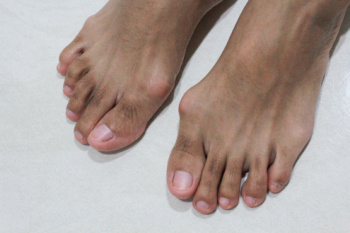
A bunion is a bony protrusion that forms at the base of the big toe, causing the toe to angle inward toward the other toes. This deformity can lead to pain, swelling, and difficulty finding comfortable footwear, and can significantly affect daily activities. The primary causes of bunions include genetics, wearing improper footwear, especially tight or high-heeled shoes, and certain foot structures. When the big toe is forced out of alignment, it places increased pressure on the joint, leading to inflammation and pain. Even after treatment, bunions can return if underlying factors, like shoe choice or foot mechanics, are not addressed. Treatment options include conservative measures like wearing supportive shoes and using custom orthotics to reduce pressure, as well as more invasive solutions like surgery for severe cases. If you have a bunion or are experiencing foot pain, it is suggested that you schedule an appointment with a podiatrist to discuss treatment options for relief, tailored to your needs.
If you are suffering from bunion pain, contact one of our podiatrists of New Tampa Foot & Ankle. Our doctors can provide the care you need to keep you pain-free and on your feet.
What Is a Bunion?
Bunions are painful bony bumps that usually develop on the inside of the foot at the joint of the big toe. As the deformity increases over time, it may become painful to walk and wear shoes. Women are more likely to exacerbate existing bunions since they often wear tight, narrow shoes that shift their toes together. Bunion pain can be relieved by wearing wider shoes with enough room for the toes.
Causes
- Genetics – some people inherit feet that are more prone to bunion development
- Inflammatory Conditions - rheumatoid arthritis and polio may cause bunion development
Symptoms
- Redness and inflammation
- Pain and tenderness
- Callus or corns on the bump
- Restricted motion in the big toe
In order to diagnose your bunion, your podiatrist may ask about your medical history, symptoms, and general health. Your doctor might also order an x-ray to take a closer look at your feet. Nonsurgical treatment options include orthotics, padding, icing, changes in footwear, and medication. If nonsurgical treatments don’t alleviate your bunion pain, surgery may be necessary.
If you have any questions, please feel free to contact our office located in Wesley Chapel, FL . We offer the newest diagnostic and treatment technologies for all your foot care needs.
